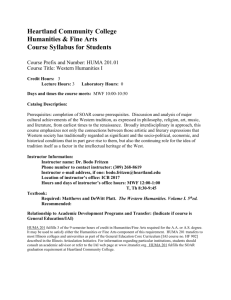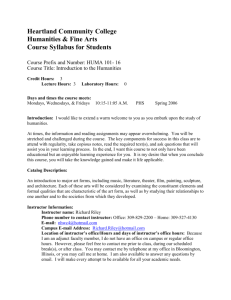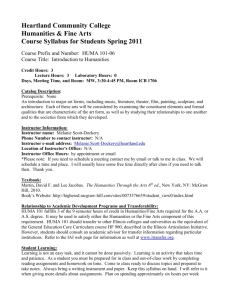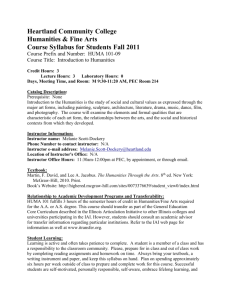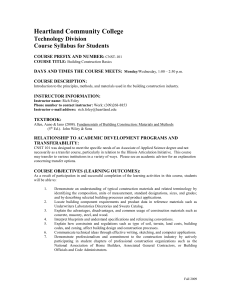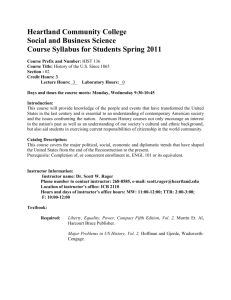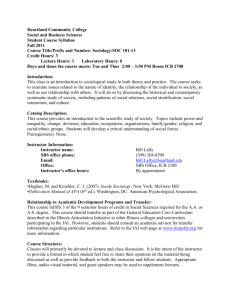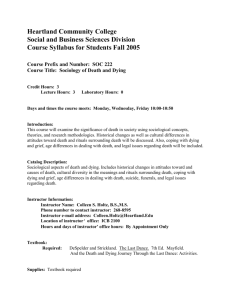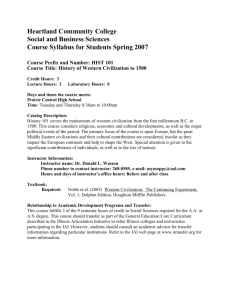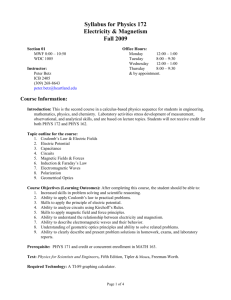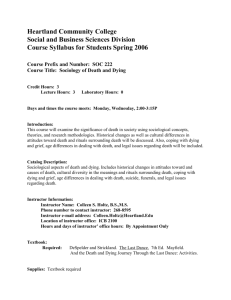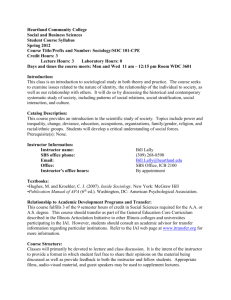Heartland Community College Humanities & Fine Arts Course
advertisement
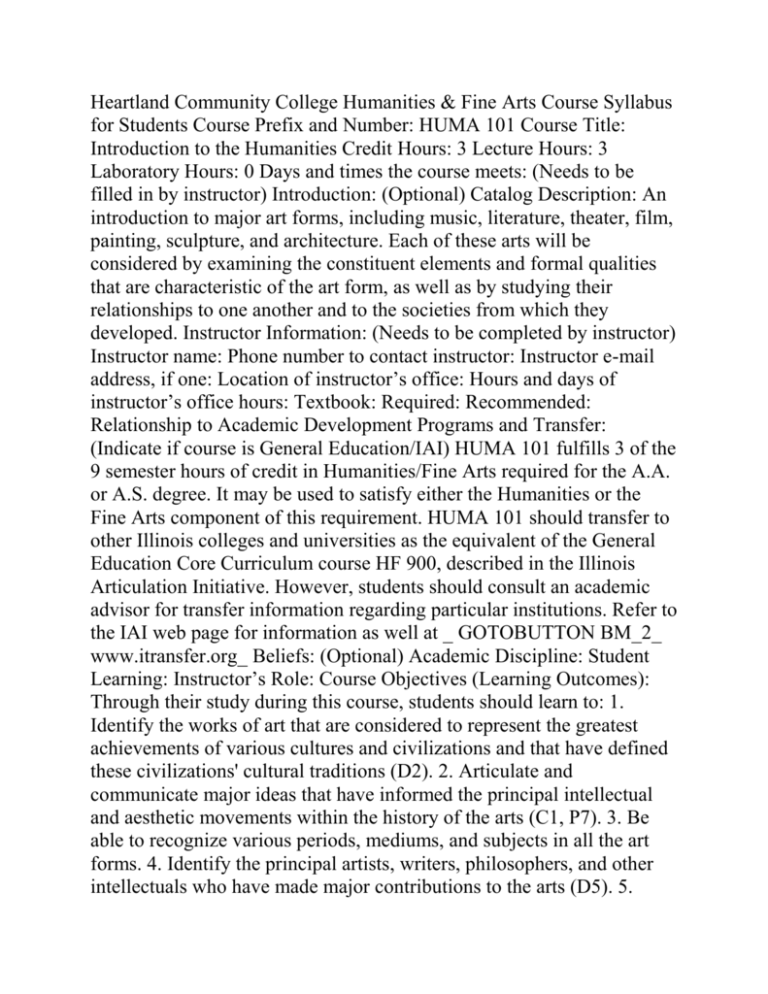
Heartland Community College Humanities & Fine Arts Course Syllabus for Students Course Prefix and Number: HUMA 101 Course Title: Introduction to the Humanities Credit Hours: 3 Lecture Hours: 3 Laboratory Hours: 0 Days and times the course meets: (Needs to be filled in by instructor) Introduction: (Optional) Catalog Description: An introduction to major art forms, including music, literature, theater, film, painting, sculpture, and architecture. Each of these arts will be considered by examining the constituent elements and formal qualities that are characteristic of the art form, as well as by studying their relationships to one another and to the societies from which they developed. Instructor Information: (Needs to be completed by instructor) Instructor name: Phone number to contact instructor: Instructor e-mail address, if one: Location of instructor’s office: Hours and days of instructor’s office hours: Textbook: Required: Recommended: Relationship to Academic Development Programs and Transfer: (Indicate if course is General Education/IAI) HUMA 101 fulfills 3 of the 9 semester hours of credit in Humanities/Fine Arts required for the A.A. or A.S. degree. It may be used to satisfy either the Humanities or the Fine Arts component of this requirement. HUMA 101 should transfer to other Illinois colleges and universities as the equivalent of the General Education Core Curriculum course HF 900, described in the Illinois Articulation Initiative. However, students should consult an academic advisor for transfer information regarding particular institutions. Refer to the IAI web page for information as well at _ GOTOBUTTON BM_2_ www.itransfer.org_ Beliefs: (Optional) Academic Discipline: Student Learning: Instructor’s Role: Course Objectives (Learning Outcomes): Through their study during this course, students should learn to: 1. Identify the works of art that are considered to represent the greatest achievements of various cultures and civilizations and that have defined these civilizations' cultural traditions (D2). 2. Articulate and communicate major ideas that have informed the principal intellectual and aesthetic movements within the history of the arts (C1, P7). 3. Be able to recognize various periods, mediums, and subjects in all the art forms. 4. Identify the principal artists, writers, philosophers, and other intellectuals who have made major contributions to the arts (D5). 5. Compare non-Western cultural and artistic values to those of the West, recognizing non-Western adaptations to and influences on Western culture and aesthetics (D3). 6. Articulate both in speech and in writing those personal thoughts and observations that have come about due to class assignments and discussions (C4, C7). 7. Demonstrate awareness, tolerance, and appreciation of the extent and impact of cultural diversity in our society as reflected in the arts (D1). 8. Interact with other individuals and in groups to come to a consensus about an aesthetic problem and to solve it (P7). 9. Identify appropriate topics for scholarly research in the arts and humanities, utilize standard bibliographic and other research tools, select suitable sources and methodology, and write papers presenting the results of their research while observing the conventions of scholarly discourse (C6). Course/Lab Outlines: 1. The Humanities: An Introduction 2. What is a Work of Art? 3. Being a Critic of the Arts 4. Painting 5. Sculpture 6. Architecture 7. Literature 8. Drama 9. Music 10. Dance 11. The Film 12. Photography 13. AlmostArt 14. The Humanities:Their Interrelationships Methods of Instruction: (Optional) Course Policies: (The following are optional) Method of Evaluation (Tests/Exams, Grading System): Grades will be assigned according to the following scale: 92-100 % = A 83-91 % =B 74-82 % =C 65-73 % =D Below 65%=F Grading Policy: Participation (or Attendance): Class Participation: Incompletes: Extra Credit: Make-up of tests and assignments: Deadlines: Required Writing and Reading: Students will write one long paper (12-15 pages) presenting the results of students' independent library research (or the equivalent in shorter papers). Students will engage in extensive readings from both the required text and from other sources relevant to the arts and the humanities. Student Conduct: Academic Integrity and Plagiarism Academic Integrity Academic integrity is a fundamental principle of collegial life at Heartland Community College and is essential to the credibility of the College’s educational programs. Moreover, because grading may be competitive, students who misrepresent their academic work violate the right of their fellow students. The College, therefore, views any act of academic dishonest as a serious offense requiring disciplinary measures, including course failure, suspension, and even expulsion from the College. In addition, an act of academic dishonesty may have unforeseen effects far beyond any officially imposed penalties. Violations of academic integrity include, but are not limited to cheating, aiding or suborning cheating or other acts of academic dishonesty, plagiarism, misrepresentation of data, falsification of academic records or documents and unauthorized access to computerized academic or administrative records or systems. Definitions of these violations may be found in the college catalog. Plagiarism Plagiarism is the presenting of others’ ideas as if they were your own. When you write a paper, create a project, do a presentation or create anything original, it is assumed that all the work, except for that which is attributed to another author or creator, is your own. Plagiarism is considered a serious academic offense and may take the following forms: 1 Copying word-for-word from another source and not giving that source credit. 2 Paraphrasing the work of another and not giving that source credit. 3 Adopting a particularly apt phrase as your own. 4 Using an image or a copy of an image without crediting its source. 5 Paraphrasing someone else’s line of thinking in the development of a topic as if it were your own. 6 Receiving excessive help from a friend or elsewhere, or using another project as if it were your own. Note that word-for-word copying is not the only form of plagiarism. The penalties for plagiarism may be severe, ranging from failure on the particular piece of work, failure in the course or expulsion from school in extreme cases. [Adapted from the Modem Language Association’s MLA Handbook for Writers of Research Papers. New York: MLA, 1995: 26] Support Services: Heartland Library Information The Library, located in the Students Commons Buildings at the Raab Road campus, provides Heartland students with a full range of resources including books, online journal databases, videos, newspapers, periodicals, reserves, and interlibrary loan. Librarians are available to assist in locating information. For more information please call the Library (309) 2688200 or (309) 268-8292 Tutoring Center Heartland Community College offers tutoring in various forms at no cost to Heartland students at the Academic Support Center (ASC) in Normal and at the Pontiac and Lincoln Centers. Tutors are available at convenient times throughout the week. Study groups, group tutoring facilitated by a specially-trained tutor, are also available by request. For more information about services available at each location, please call the ASC in Normal (309) 2688231; the Pontiac Center (815) 842-6777; the Lincoln Center (217) 7351731. Testing Center The Testing Center provides a quiet environment for students to complete make-up exams, online exams, and exams for students with special accommodations. Students may be able to complete exams in the Testing Center if arrangements are made with their instructor. For more information, contact the Testing Center at (309) 268-8231. Specifications for written materials: (Optional) Syllabi disclaimer: (Optional) Course Calendar: (Needs to be completed by Instructor
